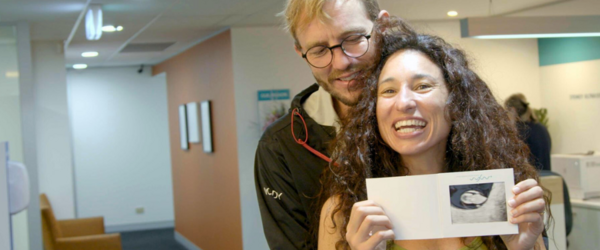IVF Process & Treatment - Queensland Fertility Group
In Vitro Fertilisation (IVF) is a type of assisted reproductive technology (ART) used to treat a wide range of reproductive conditions including infertility, giving many couples the best chance of having a baby.
At Queensland Fertility Group your IVF treatment will be coordinated by your fertility specialist who is supported by an experienced team of nurses, counsellors and scientists. We understand how important having a family is to you and will provide you with the highest standard of care throughout every step of the IVF process.
Enquire Today
Why IVF treatment might be needed?
There are many factors that can affect your fertility, some of the factors where IVF is highly effective in helping you achieve a successful pregnancy include:
- Damaged fallopian tubes
- Endometriosis
- Ovulation issues
- Low sperm count and motility
- Previous vasectomy or tubal ligation
- Unexplained infertility
- Recurrent miscarriage
- Inherited genetic diseases like hemophilia and cystic fibrosis
If you are concerned about any of these factors, our fertility specialists can provide you with an assessment and offer expert advice on the best treatment options for your circumstances.
To find out more about what’s involved in IVF treatment register for one of our free information nights, and have your questions answered by a Fertility Specialist. Alternatively, call us on 1800 111 483 for confidential fertility advice, or to make an appointment with a QFG Specialist.
Read more about freezing embryos...
Read more about our IVF costs...
Learn more about the IVF journey with the Big Miracles docuseries...
What is the process of IVF?
While every patient's IVF journey will look different, a treatment plan for IVF will typically involve the following steps.
Step 1: Initial specialist appointment
At your first appointment, your fertility specialist will review your medical history, all previous investigations and treatment, and give you preliminary advice about your treatment options. Your specialist may also order some basic fertility tests for further investigation. You and your partner should attend the first appointment together.
Step 2: Pre-treatment consultation
Meet again with your fertility specialist to review results of fertility tests, confirm your treatment plan and ask any questions. Make sure you discuss any complementary medicines you’re taking, as these may interfere with your treatment.
Step 3: Treatment begins
A nurse orientation will be arranged where you’ll receive the IVF medications you need, go through the treatment cycle timeline, have you sign the relevant consent forms and show you how to give yourself the different medications, usually starting with Follicle Stimulating Hormone (FSH) injections. We recommend both you and your partner attend this appointment.
Step 4: Hormone stimulation
A couple days after the start of your next menstrual cycle, you will start self-administering the IVF injections with a diabetic-style pen to begin ovarian stimulation.
Step 5: Treatment monitoring
Throughout your cycle, we measure your hormone levels with regular blood tests and use ultrasounds to measure the size and number of your ovarian follicles. This also helps us identify the best time for administering the trigger and performing the egg collection. Your treating clinician will determine the need and frequency of these tests. Your QFG treatment costs include all your blood and ultrasound tests.
Step 6: Trigger injection
Once you have the optimum number and size of follicles, we plan your egg collection. This typically involves a trigger injection of hCG (human chorionic gonadotropin) to induce egg maturation. Egg collection then occurs between 36 and 38 hours later. The hCG injection has a similar effect to the body’s natural Luteinising Hormone (LH) surge that causes egg maturation. Sometimes an “agonist” trigger is used, which causes the release of your own LH to induce egg maturation.
Step 7: Egg collection in day surgery
We collect eggs via a day surgery procedure, and usually under a general anaesthetic using ultrasound guidance. You will be at the hospital for about four hours, and you’ll need someone to drive you home afterwards. We suggest not returning to work until the following day.
In some rare cases, your Fertility Specialist may need to collect the eggs with a laparoscope if the ovaries cannot be easily accessed.
On the morning of your egg retrieval, your partner will be asked to provide a fresh semen sample so that the sperm is in the best condition to fertilise your eggs. Alternatively, if you are using frozen or donor sperm, we will thaw the sperm very close to the time that your eggs are collected.
Step 8: Egg fertilisation
After the eggs have been retrieved, they are immediately transferred to the laboratory, where they are prepared for fertilisation. There are two methods for inseminating eggs, standard IVF and intracytoplasmic sperm injection (ICSI). In IVF, prepared sperm and eggs are placed together in a dish where fertilisation occurs. During ICSI, an individual sperm is selected by a highly experienced embryologist, and, under very delicate microscopic control, each egg is injected with a single healthy sperm.
Step 9: Embryo development
Inseminated eggs are then placed in time-lapse incubators at 37 degrees, to mimic the temperature of the human body so that fertilisation can occur and the resulting embryos can develop to an advanced stage known as blastocyst after 5-6 days.
Step 10: Embryo transfer
Embryo transfer is a simple procedure similar to a pap smear and usually takes place five days after egg collection although earlier transfers are occasionally performed. The embryo is transferred into the uterus using a very fine catheter that is threaded through the cervix.
Step 11: Embryo freezing
Any extra embryos not used during a treatment cycle can be frozen and stored until you wish to use them.
Step 12: Pregnancy blood test
A pregnancy test will be arranged 10-14 days after your embryo transfer.
A blood test is the most reliable form of pregnancy test, as urinary pregnancy test kits can provide a false reading due to the hormone medication used in IVF treatment.
Your pregnancy blood test results are usually available by mid-afternoon. If the pregnancy test is positive, we will organise an ultrasound scan approximately three weeks later.
Find an IVF clinic near you
At Queensland Fertility Group, we are proud of the fact that our patients are treated by some of best fertility specialists in Australia. We offer patients the choice of more IVF clinics than any other fertility group in Queensland.
North Queensland
South East Queensland
IVF process and treatment FAQs
What is IVF treatment?
IVF stands for In Vitro Fertilisation, in vitro meaning ‘in glass’, so taken together, IVF means fertilisation, which takes place outside of the body.
IVF treatment was originally developed as a way to overcome problems due to blocked (or missing) fallopian tubes. Over the past few decades, IVF has helped many thousands of couples achieve their dream of having a baby. IVF treatment is now used to overcome many fertility issues including gynaecological conditions, genetic disorders, sperm problems, age-related infertility and unexplained infertility.
How does the IVF process work?
The IVF process involves extracting eggs from a woman's ovaries and placing them in a culture dish along with sperm, allowing the process of fertilisation to take place outside the body to produce embryos. The embryos are then grown in the laboratory over five to six days days. An embryo transfer is performed to place the embryo in the woman's uterus with the goal of implanting and developing into a baby
How much does IVF cost in Queensland?
At QFG, we offer flexible payment options for fertility treatments through Zip Money, including 24 months* interest free payment plans. While some IVF treatment costs are covered by Medicare there are usually out-of-pocket costs. In addition to QFG costs, it’s important to factor in other possible costs including fees charged by your treating Fertility Specialist during your cycle, the costs associated with private hospital and anaesthetist fees.
For an overview of QFG’s IVF treatment costs, visit our treatment costs page. Our staff are experts in explaining all of the costs involved and navigating the Medicare Safety Net. If you have any questions regarding our IVF costs, please call 1800 111 483 or complete the form below.
How long does the IVF treatment process take?
The average IVF treatment cycle takes two to three weeks from start of FSH injections to embryo transfer.
IUI vs IVF
Artificial Insemination, or Intrauterine Insemination (IUI), is considered a simpler and more affordable starting point for fertility treatment and may be recommended before considering IVF.
If you or your partner have been diagnosed with unexplained infertility, minor sperm abnormalities or other male fertility issues, IUI may increase your chances of having a baby.
However, depending on how low sperm quality is in terms of sperm count and motility, IUI may not be suitable. In these cases, your specialist may suggest Intracytoplasmic Sperm Injection (ICSI) as part of your IVF treatment plan. ICSI is a specialised form of IVF that assists low quality sperm to fertilise eggs.
Can you choose gender with IVF?
In Australia, gender selection during the IVF process is illegal due to the ethical, legal and social issues it raises. However, gender selection may be allowed if it is required to avoid the transmission of a genetic disorder which would only affect one gender. Genetic testing in IVF is not available for family balancing purposes.
Download our IVF booklet
For more information about IVF, visit our Patient Information Booklets page or contact us below.
Top 5 myths about IVF
- Transcript
Top 5 Myths about IVF, with Dr Julie Buchanan
There are quite a few misconceptions about In vitro fertilization or IVF fertility treatment. So let's talk about it.
Hello, and welcome to Fertile Minds. I'm Dr. Julie Buchanan, a Fertility Specialist from Queensland Fertility Group. And today we'll talk through the top five myths about IVF.
1. IVF is often the first and only fertility treatment tried. False.
You may not always need IVF. So we start by doing a fertility assessment to better understand your individual situation and then determine whether IVF is right for you. Other more simple treatments may include, lifestyle changes and optimising pre-existing medical conditions.
This may be all some people need. However, if treatment is recommended, this may include, ovulation cycle tracking, ovulation induction, or artificial insemination. A fertility assessment is an important first step to find out what treatment could be right for you.
2. You can do IVF at any age. False.
Female fertility is highly dependent on age. Female age is the number one determining factor for a successful pregnancy. Although IVF does increase the chances of conceiving, the number and quality of the eggs collected in an IVF cycle decrease the older you become.
3. You're way more likely to have multiple births through IVF. False.
Historically, treatment was commonly linked with multiple births or twin births. But this is far less common these days. This is mainly because the number of embryos being transferred back inside the uterus is restricted to one. We have increased technology and laboratory capabilities. And why do we want to avoid multiple births? There is a higher risk for the mother and the babies predominantly prematurity for the babies and obstetric complications for mom.
4. Will IVF affect my ability to work? Not necessarily.
In all fertility treatments, we try and make sure that your appointments can be done early in the morning before your usual start of work. For the egg collection procedure, you will be at the hospital for about four hours, and you'll need someone to drive you home afterwards. This is the only time that we suggest taking off from work and not returning until the day after the procedure.
5. Babies conceived through IVF will have a high risk of health issues such as low birth rates or developmental delays. This is false.
The vast majority of studies have not found an increased risk of birth defects in babies conceived with IVF. Please be rest assured that a majority of babies conceived through IVF grow up to be healthy adults and compare well to those conceived naturally. One in 20 children in Australian classrooms are born via assisted reproductive technologies.
There are quite a few misconceptions about IVF fertility treatment. So let's talk about it.
1. IVF is often the first and only fertility treatment tried. False.
You may not always need IVF. So we start by doing a fertility assessment to better understand your individual situation and then determine which fertility treatment is right for you. Other simple interventions may include lifestyle changes and optimising pre-existing medical conditions.
This may be all some people need. However, if treatment is recommended, this may include ovulation cycle tracking, ovulation induction, or artificial insemination. A fertility assessment is an important first step to find out what treatment could be right for you.
2. You can do IVF at any age. False.
Female fertility is highly dependent on age. Female age is the number one factor determining the success rate of IVF. Although IVF does increase the chances of conceiving, the number and quality of the eggs collected in an IVF cycle decrease the older you become.
Learn more about IVF success rates by age.
3. You're way more likely to have multiple births through IVF. False.
Historically, IVF treatment was commonly linked with multiple births or twin births. But this is far less common these days. This is mainly because the number of embryos being transferred to the uterus is restricted to one in the vast majority of cases. We have increased technology and laboratory capabilities, which enable us to better select one embryo for transfer. And why do we want to avoid multiple births? There is a higher risk for the mother and the babies, predominantly prematurity for the babies and obstetric complications for mum.
4. Will IVF affect my ability to work? Not necessarily.
In all fertility treatments, we try and make sure that your appointments can be done early in the morning before your usual start of work. For the egg collection procedure, you will be at the hospital for about four hours, and you'll need someone to drive you home afterwards. Egg retrieval day is the only time that we suggest taking off from work and not returning until the day after the procedure.
5. Babies conceived through IVF will have a high risk of health issues such as low birth rates or developmental delays. This is false.
The vast majority of studies have not found an increased risk of birth defects in babies conceived with IVF. You can rest assured that the majority of babies conceived through IVF grow up to be healthy adults and compare well to those conceived naturally. One in 20 children in Australian classrooms are born via assisted reproductive technologies.
Want more information?
To find out more about what’s involved in IVF treatment register for one of our free information nights, and have your questions answered by a fertility specialist. Alternatively, call us on 1800 111 483 for confidential fertility advice, or to make an appointment with a QFG Specialist.
- Read more about freezing embryos
- Read more about our IVF costs
- Learn more about the IVF journey with the Big Miracles docuseries
Recommended Reads

Self care during IVF treatment
Looking after your emotional health is just as important as what’s going on physically in an IVF cycle. The frustrations of infertility can place strain on mental health and relationships. Read our tips for self care here.

Managing relationships during IVF
Struggling to conceive is tough enough, but maintaining relationships while undergoing the ups and downs of fertility treatment has its own set of challenges.

Big Miracles: IVF Documentary Series
Big Miracles is a documentary series available on 9Now, capturing the candid moments of real Australian couples going through IVF and other fertility treatments. The show, filmed within IVFAustralia clinics, reveals an inside look into the complexities of fertility treatment, from seeing specialist pre-treatment consultations,the fateful egg collection and laboratory process.